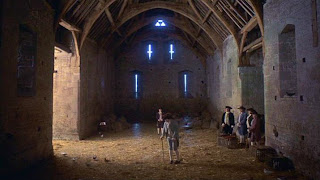Part of the Filmmusic Blog-a-thon hosted by Windmills of My Mind
“Hi. I’ve got a tape I’d like to play.”

Stop Making Sense thus gets under way. Not with blaring intro, smoke and pyrotechnics, but rather with one lone man armed with a guitar and a small boom box on a bare stage. This 1984 concert film by the Talking Heads ignores all the rules and just goes on its own merry way. It is the best concert film I’ve ever seen.
The Heads might seem an odd choice to present in this homey, low-key setting. David Byrne, after all, was the artist who once wrote a song that observed a scene of suburban bliss, and then concluded, “I wouldn’t live there if you paid me to.” All those songs about urban angst are in here, too, but the concert itself is joyful, not morose.
Take the opening bit. Byrne sets the boom box down, and behind a simple percussion beat, kicks into “Psycho Killer” This is a song about mental illness, but it’s also arguably the head’s most catchy tune, and watching Byrne strut and shimmy is FUN, despite the lyrics.
The concert itself is set up in a loose, informal way. After the opening bit, bassist Tina Weymouth joins Byrne onstage and the two of them play “Heaven”, after which drummer Chris Frantz joins in on “Thank You for Sending Me an Angel”, and so on until the stage is full of musicians. During the music, the stagehands are quietly setting up the next instrument, all in full view. Byrne and director Jonathon Demme wanted the focus to be on the music, not on the ancillary things that make up most concerts.
Ah, the music. The Talking Heads were a great favorite of mine in my younger days, and this concert catches them on a night (actually several nights) when they were “On”. The product presented onstage is in stark contrast to the image that their lyrics convey. Byrne himself is a physical contradiction. Facially, he pretty much maintains his joyless android look, but the rest of his body gives him away. Watch the guy dancing with two backup singers during “Slippery People”, and tell me he isn’t having fun.

For me, the two highlights of the film are a torrid rendition of “Life During Wartime”, from the great Fear of Music album, and “Once in a Lifetime”, for which Byrne dons Buddy Holly-esque glasses, and a suit jacket that seems a couple of sizes too big. It’s such a great song that it’s easy to miss how simply it is presented. The camera just holds on Byrne in a medium shot as he performs on a dark stage with just one small light illuminating him, and Byrne takes his great tune about domestic normalcy and injects it with equal parts funk, punk, and spastic madness.
It’s also striking to see how democratically Demme presents the musicians. Byrne is of course the focus, but the backup players are featured just as prominently as the band members. That’s as it should be, too, because bongo player Steve Scales and guitarist Alex Weir are as instrumental to the heat created on stage as the Heads are.

If the film has a weak spot, it’s in the inclusion of “Genius of Love”, by Tom Tom Club, which was the side project band led by Weymouth and Frantz. This is the only time Byrne isn’t on stage, and the film suffers for it. The song isn’t strong, and Weymouth has none of Byrnes’ jittery charisma.
Towards the end of the film, the camera turns around and gives us our first real audience reaction shot, and we suddenly realize that yeah, there haven’t been any audience shots. That’s one of the major ways that SMS strays from the tested and true, and it works beautifully. When we do see the audience, they are dancing in the aisle, as we might expect. Withholding this shot adds to the feeling that the concert has built to a crescendo. Instead of being bombarded with fast cuts and endless shots of people bopping away, we get to watch the band. What a novel idea.




























